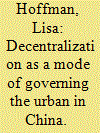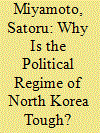|
|
|
Sort Order |
|
|
|
Items / Page
|
|
|
|
|
|
|
| Srl | Item |
| 1 |
ID:
185335


|
|
|
|
|
| Summary/Abstract |
This article contributes to the study of governmentalities of the late twentieth century with regard to the proliferation of computers and information technology. Based on archival materials and oral history interviews, this study reconstructs and analyses the story of Franco–Soviet cooperation in the field of economics from the late 1950s to the 1980s, which was initially motivated by a common interest in promoting planning methods, but was later recast as a dialogue dominated by technical issues of information processing and communication and ultimately became part of a commercial strategy to support the French and Eastern European computer industries.
|
|
|
|
|
|
|
|
|
|
|
|
|
|
|
|
| 2 |
ID:
128527


|
|
|
|
|
| Publication |
2013.
|
| Summary/Abstract |
This paper considers what a Foucauldian-informed analysis of decentralization and urban transformation offers to current debates. It analyzes decentralization as a new regime of governing, in contrast to many studies that treat it as a policy process, objective or outcome aimed at alleviating some problem of centralized authority. Rather than understanding decentralization as less state governance, this paper asks how practices such as local autonomy are in fact technologies of governing the urban. Decentralization is analyzed then not simply as an absence of some central state power, either in the political or fiscal realm, but rather, as new mechanisms of governing the urban, which are linked with the regulation and constitution of subjects. The paper focuses on an aspect of decentralization that typically is under-examined: the decentralization of welfare provisioning in urban China. Under high socialism of the Maoist era, social services for urban residents were distributed by the state, through the work unit (danwei) as part of the planned economy. In recent years, however, major reforms have been put into place to diversify the ways in which social services are delivered, under a general rubric of decentralizing the distribution away from the state. Based on anthropological research in Dalian, a major port city in northeast China, this paper examines a new social practice and subject form that has emerged with new ways of caring for those in need in the city: volunteerism. By focusing on this resulting social form, the paper argues that we may better understand how decentralization is not a singular process with multiple outcomes, but rather, a complex assemblage of elements that includes technical questions about how to govern as well as normative practices of subject formation. An analytical disaggregation of these elements also allows us to avoid the assumption that decentralization necessarily contains certain characteristics, or that it will lead to particular kinds of political and social forms.
|
|
|
|
|
|
|
|
|
|
|
|
|
|
|
|
| 3 |
ID:
026184


|
|
|
|
|
| Publication |
London, Macmillian Press, 1971.
|
| Description |
vi,261p
|
|
|
|
|
|
|
|
|
|
|
|
Copies: C:1/I:0,R:0,Q:0
Circulation
| Accession# | Call# | Current Location | Status | Policy | Location |
| 008290 | 330.124/KAS 008290 | Main | On Shelf | General | |
|
|
|
|
| 4 |
ID:
173435


|
|
|
|
|
| Summary/Abstract |
The Russian Revolution is analysed in this paper in the context of a conjuncture dominated by counterrevolution. Beginning with the repression of the 1850s, a process of permanent counterrevolution has become the over-determining trend of social-political history. The Russian Revolution was subject to several distinct aspects of this process. First was external counterrevolution, the attack on it from the outside. Whilst Anglo-America was the main bulwark organising it, the Nazi/fascist counterrevolution and invasion of the USSR was an example of counterrevolution that ran out of control and ended in a defeat in Europe that was only overcome through a long and risky Cold War. Internal counterrevolution affected the Russian Revolution as part of a longer process of adjusting socialist theory to successive defeats. In the Soviet case, Socialism in One Country was the decisive mutation in this respect and must be viewed as the decisive component of the triumph of counterrevolution. After the war, Anglo-America adjusted the counterrevolutionary strategy to surgical excisions of socialist tendencies until the USSR, isolated and ideologically exhausted, collapsed. Even so, several of its legacies continue to be relevant, notably the nationality policy and internationalism. Also, today’s information revolution casts a new light on the Soviet planning experience that must be studied now that capitalism is slipping into a systemic crisis.
|
|
|
|
|
|
|
|
|
|
|
|
|
|
|
|
| 5 |
ID:
148773


|
|
|
|
|
| Summary/Abstract |
This article uses fresh archival evidence to point at a rarely noticed phenomenon, namely the undermining of the planned economy by a myriad of dispersed acts of resistance during the last years of the Cultural Revolution. Villagers reconnected with the market in some of the poorest places in the hinterland as well as in better-off regions along the coast. This silent, structural revolution often involved the quiet acquiescence, if not active cooperation, of local cadres. In conclusion, the article suggests that if there was an architect of economic reforms, it was the people and not Deng Xiaoping: as with his counterparts in Central Europe and the Soviet Union, Deng had little choice but to go along with the flow.
|
|
|
|
|
|
|
|
|
|
|
|
|
|
|
|
| 6 |
ID:
190458


|
|
|
|
|
| Summary/Abstract |
The purpose of this paper is to examine the stability and toughness of North Korea’s political regime from the perspective of radicalism and gradualism of the market economization. Since it is believed that gradualism keeps the regime stable. I examined the hypothesis that North Korea and Cuba effectively abandoned their socialist planned economy and introduced market economization after witnessing the economic crisis in China and Vietnam during the Cold War. As a result, North Korea and Cuba experienced the economic crisis and gradual economic development after the Cold War. The socialist planned economy remained an ideal in North Korea. Therefore, market economization became gradualism because of its suppression by the ideal in North Korea.
|
|
|
|
|
|
|
|
|
|
|
|
|
|
|
|
| 7 |
ID:
190459


|
|
|
|
|
| Summary/Abstract |
The purpose of this paper is to examine the stability and toughness of North Korea’s political regime from the perspective of radicalism and gradualism of the market economization. Since it is believed that gradualism keeps the regime stable. I examined the hypothesis that North Korea and Cuba effectively abandoned their socialist planned economy and introduced market economization after witnessing the economic crisis in China and Vietnam during the Cold War. As a result, North Korea and Cuba experienced the economic crisis and gradual economic development after the Cold War. The socialist planned economy remained an ideal in North Korea. Therefore, market economization became gradualism because of its suppression by the ideal in North Korea.
|
|
|
|
|
|
|
|
|
|
|
|
|
|
|
|
|
|
|
|
|